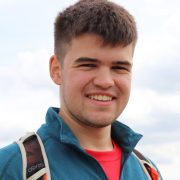James Bennett
Research Interests
James’s research interests include modelling, digital twin, computer vision, perception & decision making, and mechatronics.
Publications
- Bennett, J., Moncur, B., Fogarty, K., Clawson, G., and Fox, C. (2022) ‘Towards Open Source Hardware Robotic Woodwind: an Internal Duct Flute Player‘ International Computer Music Conference.
- Bennett, J., & Finlayson, G.D. (2024) Simplifying Tone Curves for Image Enhancement, Pre-print.
Presentations
- International Computer Music Conference 2022 (July 2022): Towards Open Source Hardware Robotic Woodwind: an Internal Duct Flute Player.
Posters
- AgriFoRwArdS CDT Annual Conference 2022 (June 2022): Developing a Line-scanning Hyperspectral Imaging System for Monitoring Plant Status.
- UEA Postgraduate Showcase Day (May 2023): Simplifying tone curves for image enhancement.
- The Towards Autonomous Robots and Systems (TAROS) Conference 2023 / CDT Annual Conference / Joint Robotics CDT Conference (September 2023): Simplifying Tone Curves for Image Enhancement.
Other Activities
- Member of the AgirFoRwArdS CDT Drink Outside the Box Organisation Committee. 2022/23
- Member of the AgriFoRwArdS CDT Advisory Board (March 2021 to present).
- Member of the AgriFoRwArdS CDT Student Panel (March 2022 to present).
- Panel member for the November 2021 AgriFoRwArdS Seminar Series with Prof Dionysis Bochtis, watch here.
- Chaired the February 2022 AgriFoRwArdS Seminar Series with Dr Mark Ryan, watch here.
- AgriForwards Spring School – awards: ‘Best Teamwork’, ‘Best Presentation’.
- Panel member for November 2022 Seminar series with Prof Harold Thimbleby.
- Awarded runner up poster in early stage category for poster (Simplifying tone curves for image enhancement) at UEA 2023 Postgraduate Research Day.
- ‘Bringing Scientists To You’ – visiting local secondary schools to run science workshops.
- Discussion panel member at AgriFoRwArdS CDT Open Day for potential students (November 2022).
About me
I am looking forward to being a part of the CDT to bring together my interests in research, engineering, and agriculture. Having experienced hands-on farming, I am excited to develop new innovations for the agricultural industry and make a difference to the future of farming.
Before joining the CDT I studied an MEng in Systems Engineering at the University of Warwick. I especially enjoyed the research and project work, including my final year project to develop an autonomous drone for campus parcel deliveries. I covered elements of robotics, computer vision, and machine learning and am eager to explore these further during the programme. This last year I have worked alongside my uncle on his dairy farm in Dorset and have developed a greater understanding and appreciation of all aspects of a working farm.
I am from Herefordshire, and in my spare time, I enjoy designing and making projects of all scales and complexity, working as a stage technician, and walking in the mountains.
MSc Project
Developing a Line-scanning Hyperspectral Imaging System for Monitoring Plant Status
This project aims to develop a hyperspectral imaging system to monitor the status of potato plants. Hyperspectral imaging has been used to study plants for many years, especially in laboratory settings, and can reveal information about plants that cannot be seen with the eye or conventional imaging technology. A system which can capture and process images of potato plants in natural lighting conditions offers the ability to monitor crops for disease and stresses. In this project, an acquisition system will be built to capture hyperspectral images from a line-scanning camera and a processing pipeline will be developed to calibrate images and extract features. The system will be tested on potatoes grown in pots in a polytunnel that are exposed to salt stress during growing.
PhD Project
Seeing Spectral Signatures
There are many applications in agri-food production where it would be very useful to measure the spectrum of light reflected from a scene rather than measuring a camera RGB. Indeed spectral signatures are useful for identifying plant species, monitoring growth and to determine the presence of disease, among other tasks. Unfortunately, spectral measurement devices are expensive, cumbersome to use, and often unsuitable for deployment in the field. In contrast conventional RGB cameras are cheap and reliable and are easy to use outside the lab.
The core aim of this project is to develop algorithms for mapping the RGB signal recorded by a conventional camera to corresponding spectral signatures that are useful for solving classification problems including ripe vs non-ripe and the diagnosis of plant diseases. The research will be based on calibration, measurement and inference. That is, we will understand the physical characteristics of our device, the spectra in the world we would like to estimate and then we will develop algorithms for mapping the RGB camera measurements to spectra. Our work will also consider mapping RGB+Near Infra Read camera systems and develop algorithms for predicting spectral signature that extend to the NIR part of the spectrum. The research will be developed in close collaboration Antobot The project will dually focus on the development of robust algorithms and the engineering of practical systems that are deployed in the field.
James’s PhD project is being carried out in collaboration with Antobot, with primary supervision by Prof Graham Finlayson.

